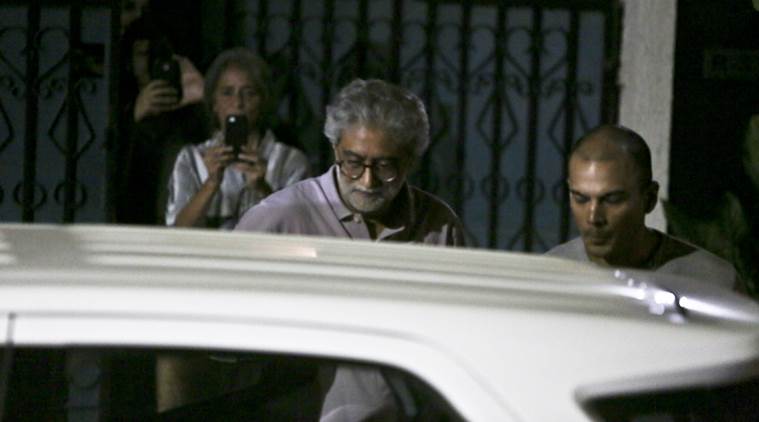
The Indian Express
Elgaar Parishad case: Navlakha moved to Mumbai from Tihar jail, family says not informed
Navlakha’s lawyers said they should have been informed and given an opportunity to be heard before shifting him to Mumbai, especially since his interim bail plea will be heard on Wednesday by the Delhi High Court.
The family and lawyers of activist Gautam Navlakha, booked in the Elgaar Parishad case, on Tuesday claimed the National Investigation Agency (NIA) brought him to Mumbai from Tihar jail in Delhi without informing them.
The NIA prosecutor said that Navlakha was produced before a court in Mumbai and has been sent to judicial custody at the Taloja jail till June 22.
Navlakha and academician Anand Teltumde – both accused of conspiring to organise the Elgaar Parishad in Pune – had surrendered before the NIA on April 14 following Supreme Court orders.
Due to the lockdown, while Navlakha had surrendered before the NIA headquaters in Delhi, Teltumbde had surrendered in Mumbai. Following this, Navlakha continued to remain in NIA custody in Delhi.
On Saturday, a Delhi court had directed Navlakha to remain in judicial custody till June 22. His interim bail application on medical grounds citing the Covid-19 pandemic is slated to be heard by the Delhi High Court on Wednesday.
His partner, Sahba Husain, said that after he was sent to Tihar jail on Saturday, she was informed the next day that he was being given a separate cell, as he is a senior citizen.
“Thereafter, I received a call from him only after he was produced before the Mumbai court. He told me that he was given less than five minutes to gather his belongings and then taken to Mumbai on an overnight train. He requested to be allowed to call his lawyers or family members but to no avail,” Husain said, adding that he was only allowed to make a call after he took permission from the special court in Mumbai where he was produced.
Special Public Prosecutor Prakash Shetty said the Mumbai court had issued a production warrant against Navlakha, based on which he was transferred from Delhi. “He was shifted since the case is pending here,” Shetty added.
Navlakha’s lawyers, however, said that they should have been informed and given an opportunity to be heard before shifting him, especially since his interim bail plea will be heard on Wednesday by the Delhi HC.
“The situation in Mumbai is worrisome given the Covid-19 pandemic. We do not understand what was the need to take him to the city… without giving his lawyers or family an opportunity to speak with him. He has always cooperated with the investigating agencies,” Husain said.
“On the one hand, you want to decongest jails as Mumbai has emerged as the epicentre of the Covid-19 pandemic and on the other, you are exposing him to this kind of risk,” she added.
Varavara Rao’s daughters write to CM Thackeray
The daughters of writer-poet Varavara Rao, also accused in the case, wrote to Maharashtra Chief Minister Uddhav Thackeray Tuesday, seeking temporary bail or parole for their father, on account of his age and the cases of Covid-19 in Talojal jail.
The letter by P Sahaja, P Anala and P Pavana read: “Our father is aged 80 and ailing with multiple health issues and highly vulnerable to be affected by coronavirus. During the last eight weeks of lockdown, we were not allowed to visit him in jail and even the usual correspondence was also disallowed. The lawyers were also not permitted to visit him. We have been extremely anxious to find out his well-being and during these eight weeks, he was allowed to make phone calls for three times to speak to our mother, who is also ailing and 70 plus. Even the phone conversation was allowed only for two minutes. He is only an Under-Trail prisoner now and even earlier he was acquitted as not guilty all the 25 cases in the last 47 years. As an under-trial prisoner, his right to life, guaranteed by Art 21 cannot be put to risk.”